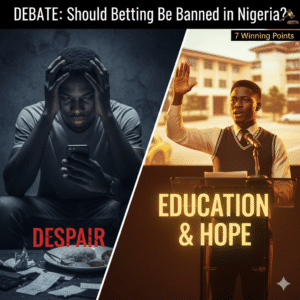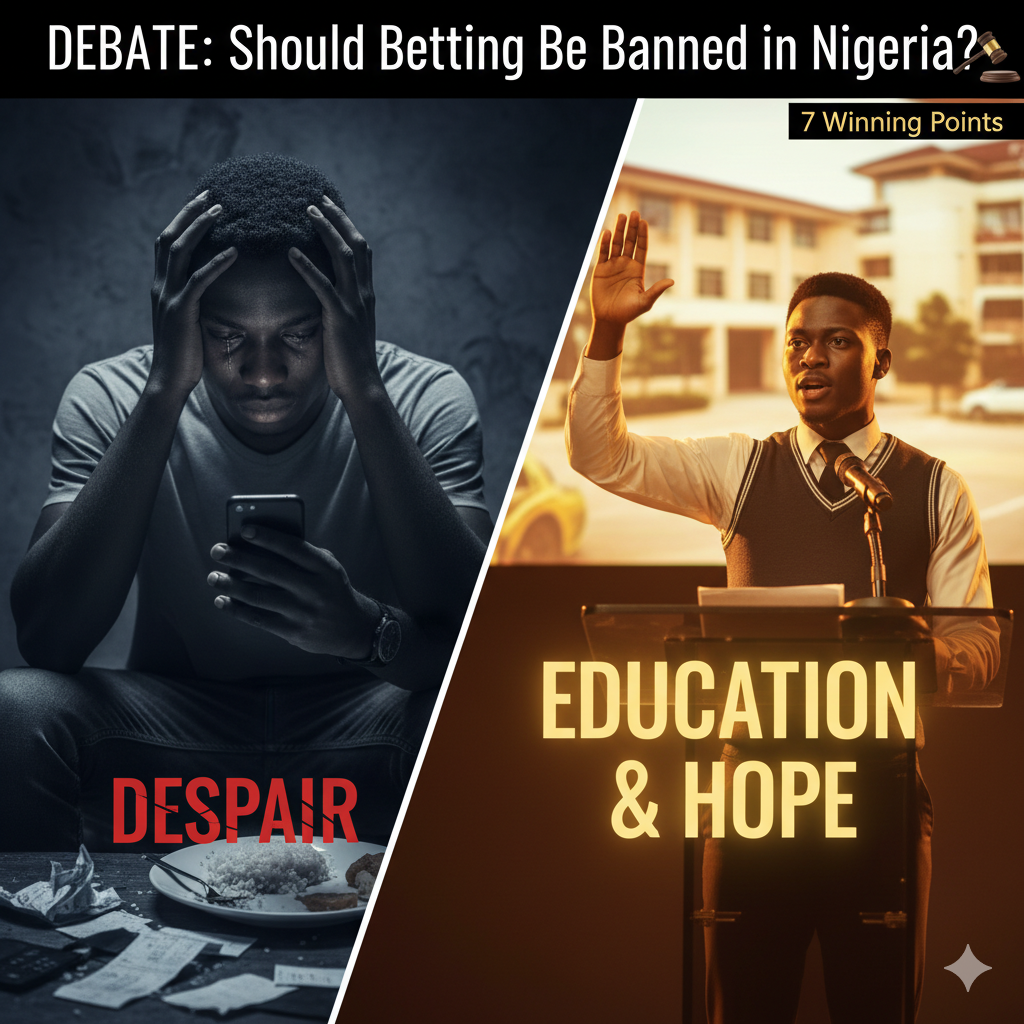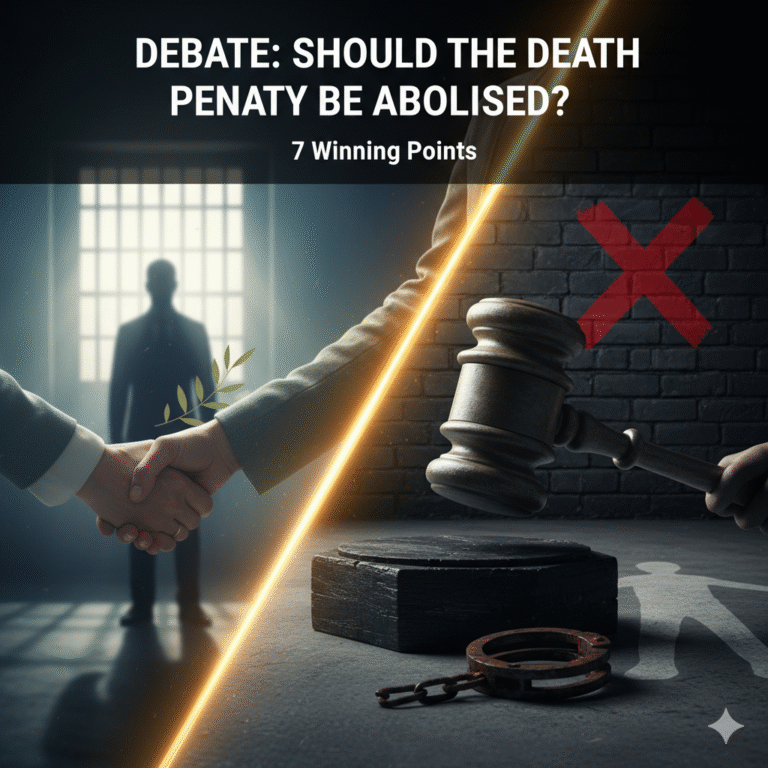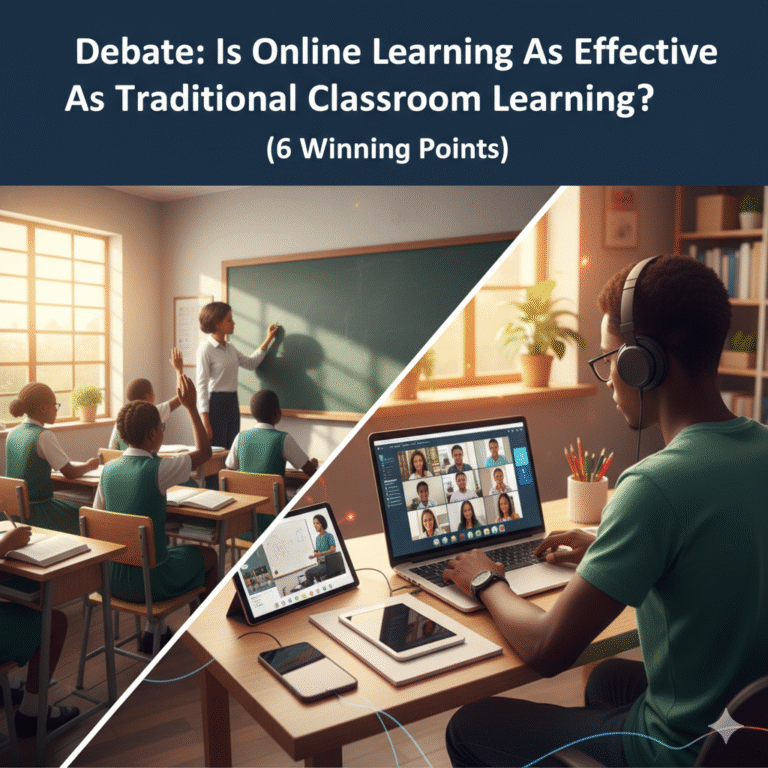Debate: Should Betting Be Banned in Nigeria? (7 Winning Points for the Motion)
Debate: Should Betting Be Banned in Nigeria? (7 Winning Points for the Motion)
Are you preparing for a debate on one of the most serious topics in Nigeria right now? You’ve come to the right place. We are tackling the tough debate on should betting be banned in Nigeria, and I’m here to give you the complete script to support the motion (that yes, it should be banned).
Before we start, let’s be clear on our terms. “Betting” (or gambling) means staking money or something of value on an event with an uncertain outcome, like a football match. A “ban” means the government should make these activities completely illegal.
Disclaimer: This article provides winning arguments for one side of an educational debate. The goal is to help you argue this position persuasively. It is not meant to diminish the arguments for regulation or personal choice, which your opponents will surely raise.
Let’s get straight to the winning points.

Winning Debate Points on Why Betting Should Be Banned in Nigeria
(You can adapt this script and use it directly at the podium)
Good day, Honourable Chairman, Panel of Judges, accurate time-keeper, co-debaters, and my fellow students. My name is [Your Name], and I am here to strongly support the motion which states: “Betting Should Be Banned in Nigeria.”
I will convince you, beyond all reasonable doubt, that betting is not a harmless pastime but a destructive force that is ruining our nation from the inside out.
1. It is a Public Health Crisis, Not a Game
My first point is simple. We must stop calling this a “game.” It is a public health crisis.
The opposition will talk about entertainment and fun. But for millions, it’s not fun. It’s a gambling addiction. This is a recognised medical condition, just like addiction to drugs or alcohol. These betting companies, with their aggressive marketing on every street and every phone, are creating a generation of addicts.
It leads directly to severe mental health issues. When people lose the money they cannot afford to lose—school fees, rent, business capital—it leads to depression, anxiety, and, sadly, even suicide. In fact, experts in Nigeria have warned about the rise in mental illnesses and even pointed to tragic cases of students taking their own lives after losing money to betting. This is not a game; it’s a disaster.
2. It Actively Harms Academic Performance
Now, let’s bring this issue home, to us as students. My opponents cannot deny the devastating effect betting is having on education.
Walk past any betting shop during school hours. Who do you see? You see young people, students in uniform, who should be in class. Instead of focusing on their books, they are focused on “odds” and “slips.”
This distraction is destroying our future. Students are spending their study time and pocket money on bets, leading to missed classes and poor academic performance. How can we build a nation of doctors, engineers, and innovators when our brightest minds are trapped in the get-rich-quick mindset of gambling? A study published on PMC PubMed Central confirmed the link between sports betting and negative academic outcomes for university students. The evidence is clear.
3. It Creates a Cycle of Poverty, Not Wealth
The biggest lie sold by betting companies is that it’s a way out of poverty. The truth is the exact opposite: betting is a cause of poverty.
Think about it. For one person to win N10,000, hundreds of other people must lose N10,000. It is a system designed to take money from the poor and give it to the rich owners of the betting companies. It is a trap.
It encourages people to gamble with the little money they have, leading to massive financial instability and debt. People borrow money to chase their losses, they sell their property, and they fall deeper into economic hardship. It doesn’t solve poverty; it creates it.
4. It Fuels Social Vices and Crime
My fourth point. What happens when a person is desperate, addicted, and has lost all their money? They turn to crime.
The link between problem gambling and a rising crime rate is undeniable. To fund their addiction, people—especially youths—start with lying, then progress to stealing from their own families.
From there, it escales to petty theft, armed robbery, and online fraud. It also causes domestic conflicts, with families breaking apart due to the financial strain and deceit. Banning betting is not just an economic issue; it is a security issue.
5. It Targets the Most Vulnerable (Youth and Unemployed)
Honourable judges, I ask you to look at the advertising. Who do these betting companies target?
They don’t target the rich and successful. They target the most vulnerable: the youth and the unemployed. They exploit the high rate of youth unemployment by selling a false hope, an “illusion of escape.”
They make their platforms as easy to access as possible, leading to a massive problem of underage gambling. Children who don’t even have a bank account are finding ways to bet. This is predatory, it is unethical, and it must be stopped.
6. “Regulation” Has Clearly Failed
My opponents will stand here and tell you, “We don’t need to ban it, we just need to regulate it!”
But I ask you: Has regulation worked? No!
We already have laws against underage gambling, but children are still betting. We have “rules” about advertising, but betting ads are everywhere, 24/7, on our TVs, on our phones, and on social media.
The truth is, these companies are too rich and too powerful. They will always find a way around the rules. The only way to protect the Nigerian people, especially the youth, is a complete and total ban.
7. It Destroys the National Value of Hard Work
Finally, and most importantly, betting destroys the very soul of our nation.
What does it teach our generation? It teaches us that hard work doesn’t pay. It teaches us that education is a waste of time. It teaches us that the only way to succeed is not through skill, innovation, or persistence, but through a lucky bet.
This get-rich-quick mindset is poisoning our culture. We are replacing the dignity of labour with the desperation of luck. If we want a future for this country, we must ban the industry that tells our children not to bother trying.
To conclude, I have proven that betting is a public health crisis, a destroyer of education, a driver of poverty, a fuel for crime, and an enemy of our national values. The “regulation” argument has failed. The only logical, moral, and responsible action is to support this motion.
Ban betting. Save our future. Thank you.
Frequently Asked Questions (FAQs)
1. What is the strongest argument against banning betting?
Your opponent will most likely focus on two things:
- Personal Freedom: They will argue that adults should be free to spend their money however they choose and that the government should not interfere (the “nanny state” argument).
- Tax Revenue & Jobs: They will point out that the industry employs thousands of people (in betting shops) and that the government makes billions in tax revenue, which could be lost.
2. How do I respond to the “Tax Revenue” argument?
This is a great place for a rebuttal. Your answer should be: “My opponent speaks about the tax revenue. But I ask you: What is the cost? Is the tax money worth more than the lives lost to suicide? Is it worth more than the students failing out of school? Is it worth the rise in crime and the cost of policing? The social and medical cost of gambling far outweighs any tax revenue it brings.”
3. What’s the best way to conclude this debate?
Your final speech (conclusion) should be powerful and emotional. Don’t just list your points again. Focus on the harm. Paint a picture for the judges. Ask them to think about the future of the Nigerian youth. End with a strong, confident call to action, just like the script above: “Ban betting. Save our future.”
Conclusion / Summary
There you have it! A complete, copy-and-paste script to win your debate on should betting be banned in Nigeria.
As we’ve shown, the arguments are clear:
- It’s a
public health crisis(addiction, mental health). - It ruins
academic performance. - It deepens
povertyanddebt. - It leads to
crimeandsocial vices. - It preys on the
unemployedandyouth. - Regulation is not working.
- It destroys our national value of hard work.
Final Disclaimer: Please remember, this is for educational purposes. Every issue has two sides, and understanding the arguments for regulation is just as important. These points are designed to give you the strongest possible “script” for this specific motion.
What do you think? Did I miss any strong points? Drop your opinions and questions in the comments section below!
Also, feel free to share this post with your classmates or anyone on your debate team. Good luck!







